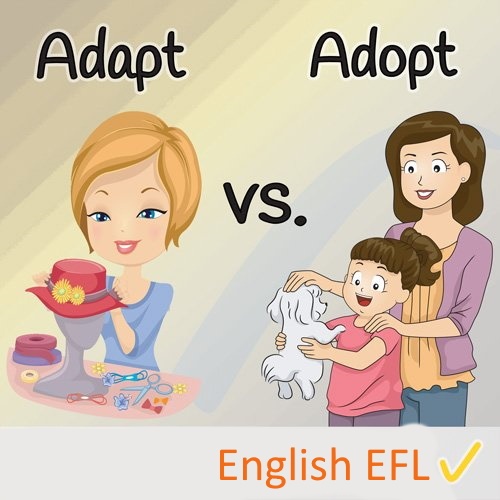Many students confuse the words adapt and adopt. How do you know when to use each one?
Both words are verbs, and there are only small differences in their spellings and pronunciations. But be careful, because the meanings of the two words are very different. Knowing when to use each one is important, because otherwise you might suggest making a change when what you mean is that you want to accept something the way it already is!

In order to understand the differences between the two words, let's look at their definitions and examples.
Adapt
The word adapt has three definitions, all related to change. The first definition is used to talk about things. When we say that we adapt something, we mean that we alter or change it in a small way.

The second definition is used to talk about people. When we say that someone adapts him or herself, we mean that the person is changing, adjusting or getting used to a new situation or circumstance.

This definition can also be used to talk about companies and organizations. When companies and organizations change or adjust to something new, they are also adapting.

Finally, adapt means to change a book or text and make it suitable for a TV program or movie. These days, many movies are adapted from novels.

The noun of adapt is adaptation. Something that is capable of adapting is adaptable, whereas something that is not capable of adapting is not adaptable or unadaptable.
Collocations
When we adapt something, we don't need to use any preposition after adapt. But when people (or institutions) adapt themselves, we have to say that they adapt to a specific situation.
Examples
- One of our closets was really big, so we adapted it for use as a home office. (One of our closets was quite large, so we changed it into a home office.)
- Teachers must be flexible and adapt their lesson plans to their students' needs. (If need be, teachers have to be willing to change their plans for their students.)
- Judith doesn't like her new job, because she's finding it difficult to adapt to the new environment. (Judith isn't enjoying her new job, because it's proving hard for her to get used to the new office.)
- Technology is changing education, and many schools are finding it difficult to adapt. (Technology is forcing schools to change, which many schools are finding difficult.)
- Tonight I'm watching an episode of the War and Peace mini-series. The program was adapted from Tolstoy's famous novel. (This evening I'm going to watch an episode of War and Peace. The new series is based on Tolstoy's famous book.)
Adopt
The word adopt has two definitions, both related to choosing or accepting something. The most common use of the word is the meaning of taking in a child (a child from another family, or a child who has no family) and raising it as one's own. Children who are taken in by families in this way are said to have been adopted.

It is also possible to adopt a pet.

Adopt can also be used to say that you accept or agree to a certain idea. This use of the word is quite formal, and is common in business settings. Companies and governments adopt policies and researchers adopt research methods.
In both cases, the noun of adopt is adoption.
Collocations
When used in the active sense, no preposition is needed after adopt. When used in the passive sense, we say that someone (or something) has been adopted by someone (or something).
For the first definition, common collocations are adoption agency, adoption lawyer and put a child up for adoption (meaning allow someone to adopt the child).
For the second definition, common collocations are adopt a policy, adopt a procedure, adopt a protocol and adopt a method.
Examples
- Bill and Linda weren't able to have any children of their own, so they decided to adopt. (Bill and Linda had trouble having a baby, so they decided to take in a child in need.)
- In my family I have one biological sister and one adopted sister, but I love them just the same. (I have two sisters. Only one is my biological sister, but I love them both equally.)
- So many dogs are in need of good homes. So instead of going to the pet store, we decided to adopt a puppy from the shelter. (Instead of buying a puppy at the pet store, we took in a puppy that had been on the streets.)
- My company has decided to adopt a new policy. Now, when people arrive late, they have to pay a fine! (My company has put in a new rule. Now, people who are late have to pay for it!)
- The government decided to adopt the committee's recommendations. (The government accepted the recommendations from the committee.)
A Story to Practice Adapt vs. Adopt
When Hannah was a child, there was a little girl in her class who was adopted. The girl's biological parents weren't able to take care of her, so they put her up for adoption. She was adopted by a young couple who weren't able to have children of their own. Everyone in Hannah's class knew that the girl had been adopted, but they didn't treat her differently from any of the other children. It wasn't difficult for the girl to adapt to her new family or school because everyone treated her in a kind and loving way.
To help her adapt, her adopted parents introduced her to everyone in the family, and helped her make friends. Other families in the neighborhood helped her to adapt too, by organizing fun events with other children.
When Hannah grew up, she decided that she wanted to adopt a child as well. She found an adoption lawyer to help her with the process and adapted her house so there would be enough room. The city had recently adopted some new rules related to adoption, so it was a little difficult to adopt the child, but in the end everything worked out.
Now, Hannah lives with her adopted daughter and they are both very happy. They both love animals and so they are thinking of adopting a kitten. They are also thinking of adopting a dog. They're a little worried that the dog and the cat won't get along, but hopefully they'll be able to adapt to each other, otherwise, the family will need to adapt to a lot of unrest!

